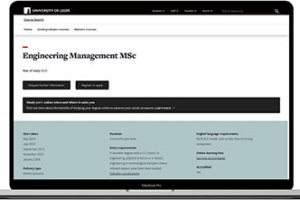What Roles Are Available for Engineers Progressing into Management?

The engineering industry is vast, and rapid developments across an array of areas from Chemical to Mechanical Engineering is influencing an increasing demand for specialist professionals, particularly for those working at a managerial level.
Alongside this, engineering incomes are also on the rise according to publisher The Engineer, with the average salary for engineers in the UK increasing by 10% in the last twelve months as the impact of Brexit becomes clearer and projects resume from lifting COVID-19 restrictions. This trend is set to continue as business confidence grows, and national governments look to jump-start economic recovery by investing in infrastructure and green technologies.
In this blog, we assess four key specialisations for engineers progressing into the management sphere in these sectors and the typical salaries of some of these management level roles.
Transitioning from engineer to engineering leader
Are you an engineer progressing to a management role or looking to take the next step in doing so? If so, it’s important to be aware of the future career prospects applicable across all areas of engineering in order to succeed.

Once progressing from an engineer to engineering management in roles such as a Senior Engineer, opportunities are then opened for development right through the heights of Engineering Director.
To become a successful engineering manager, it’s crucial to own a unique skillset with specialist knowledge in engineering, and expertise in mathematics and physical science. Alongside this, engineering managers also require skills in finance, decision-making and strategic planning to address issues in projects as they occur, and lead teams to a successful project completion. Developing these skills enables engineers to effectively transition into managerial roles, within their specific engineering specialism.
4 areas that engineers progressing to management can specialise in
Engineering Managers are vital to leading teams to the successful completion of engineering projects across a range of specialisms including chemical, civil, electrical and mechanical engineering.
1. Chemical Engineering Managers
Chemical engineering is all about changing raw materials by altering the chemical, biochemical or physical state of a substance to create everything from face creams to fuels, metals to paper, plastics to synthetic fibres and medicines.
Working to improve the quality of people’s lives, this sector of engineering is highly rewarding, and chemical engineers are also working closely with virologists, immunologists, epidemiologists and more to contribute to developments which help overcome the COVID-19 pandemic. This includes creating machinery and optimising tactics such as freeze drying to speed up the mass production process and global roll out of vaccines.
Chemical Engineering Managers play a key role in ensuring the manufacturing design and implementation of these areas are effective and underpinned by fundamental science and mathematics. Managers will be required to estimate production costs, rollout manufacturing processes, ensure health and safety regulations are adhered to, and analyse results to improve future engineering methods and approaches.

2. Civil Engineering Managers
Civil engineers make a significant impact on the world we live in and our quality of life, working on construction projects and infrastructure maintenance, which are being transformed by digital technologies such as building information modelling, digital twins, IoT and robotics.
Civil Engineering managers typically specialise in one of these fields, but each of these require the ability to lead projects and teams to conceive, design, construct and maintain infrastructure. Their key tasks may include:
- Leading site investigations to assess the value and risks of a project
- Liaising with key stakeholders such as architects, communities, contractors, and clients in developing design ideas
- Working on-site to lead teams to the successful completion of a project with awareness of health and safety standards and environmental impacts
- Managing budgets and creating project reports to analyse success
Some of the major current civil engineering projects include the new gas production centre Yamal Peninsula which will provide consumers with gas for more than 100 years, and the Sellafield nuclear project designed to treat and store historic nuclear waste. More notably, civil engineers are working to deliver the new Elizabeth Line Crossrail project; an £18.6 billion investment to increase the railway service to central London running from Berkshire and Essex. Alongside this, everyday projects such as the development of dams, power plants and water treatment works across the world shapes all elements of our society.

3. Electrical Engineering Managers
Electronic and electrical engineering principles lie at the heart of some of the world’s largest industries, requiring specialist knowledge from Engineering Managers of the mathematical and scientific principles that underpin it to enhance circuit design, communications networks, power electronics, energy conversion, control circuits, electric drives and more.
According to engineering consulting firm Modis, a contributor to the increase in jobs within electrical engineering management is the demand for knowledge, skills, and technologies in areas such as renewable energy and solar power to make the world more sustainable. Their roles may range from safely designing and testing electrics, supervising the manufacturing of an electrical device, overseeing the installation of lighting, or reducing the energy use of current electrical systems.
Some of the highly sought-after companies to work for include Arup, Siemens and TFL and to succeed in this role, engineering managers must hold a firm knowledge of electrics, good attention to detail when devising and executing plans safety, and the ability to work well as part of a team when managing a team of employees and other stakeholders.
4. Mechanical Engineering Managers
Mechanical engineers help shape the way we live through the design and manufacture of everyday items, from sports equipment to high-tech operating theatres for hospitals, vehicles and public transport infrastructure, and industrial applications such as the structural design of oil platforms.
For a Mechanical Engineering Manager, a wide range of skills are needed to achieve this in an efficient, environmentally friendly, and sustainable way. In their everyday working lives, they will be looking into how mechanical devices may help solve a problem by creating blueprints and developing prototypes of a product using CAD (computer-aided design), and CAM (computer-aided manufacturing), before analysing test results and using that information to reflect designs, manufacturing production and rollout.
Mechanical Engineering is crucial to improving efficiency and creating products that meet every day human needs. This requires strong research skills, project management skills and data interpretation to lead the success of a project from start to finish.

What are the typical salaries of an Engineering Manager?
According to Glassdoor, the typical salaries of an Engineering Manager in the UK range from £47,963-£103,343 per year as of October 2021. The rewarding salaries are typically reflective across engineering regardless of specialisation (some of which are covered in this blog), meaning engineers are free to tailor their career paths to their area of preference. See our table below for more detail:
| Job Title: | Average Salary*: |
| Director of Engineering | £103,343 per year |
| Engineering Division Manager | £64,355 per year |
| Product Engineering Manager | £60,008 per year |
| Principal Engineer | £58,867 per year |
| Senior Engineer | £48,435 per year |
| * = According to Glassdoor (statistics from October 2021) | |
In comparison to a typical engineer, whose average salary is £36,163 per year, the desirable and ever-growing remuneration in engineering management is a good incentive for engineers to progress in their careers and step into a managerial role.
If you want to become a multiskilled professional at the forefront of a range of engineering sectors, you should consider becoming an Engineering Manager with the help of our specialised Masters. Study with our range of engineering schools (Chemical & Process, Civil, Electronic & Electrical and Mechanical) in the Faculty of Engineering and Physical Sciences to suit your interests and tailor your career path.

Did you enjoy this blog? Here's some related engineering content that you may be interested in:
Want to learn more about our online Engineering Management course?

Check out the course content and how to apply.

